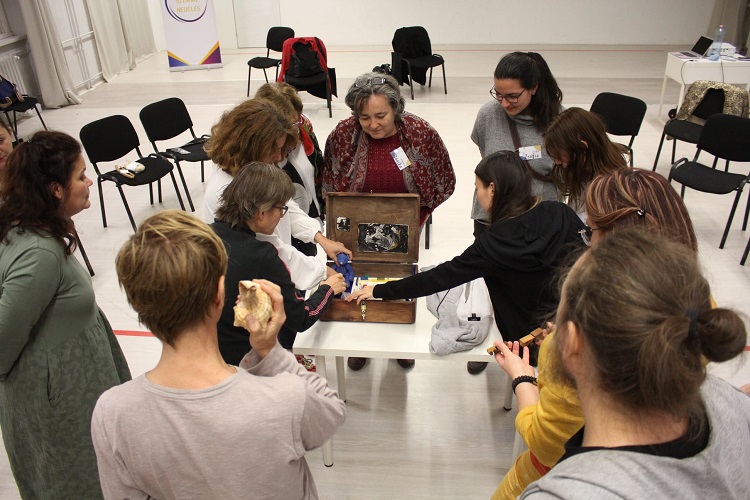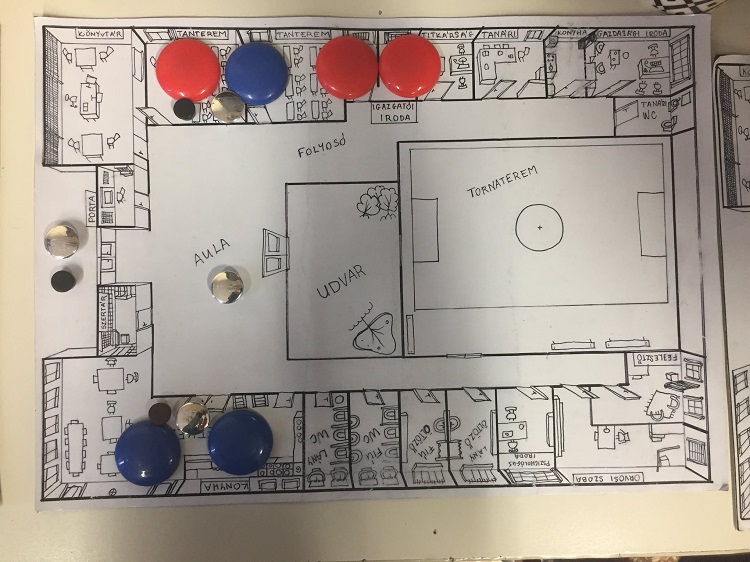
Thanks to the innovative concept of the To Be or not Be Well project, using the method of theatre and drama in education (TiE) the number of early school leavers have been reduced and at the same time sense of well-being of teachers strengthened in the participating school.
Well-being through the power of drama and theatre
We talked to Zsófia Jozifek, theatre education specialist, the leader of the consortium.
What motivated you to embark on the project?
We looked at the well-being of the different actors in the school, mainly through drama (pedagogy) and theatre education. The theme builds on the results of a previous project we did, which looked at the phenomenon of bullying in schools, using drama educational tools. This clearly showed that effective intervention strategies in relation to bullying are the strategies where the whole school thinks together about how to make the community less hierarchical and more inclusive. Moving on from there, we identified the key question: what are the needs of students in terms of engagement in learning? After all, their well-being at school as an aspect can only then be formulated, which in turn is also based on the well-being of teachers. We believe that the classroom should be an inclusive space based on the principles of acceptance and ensure that students with emotional and mental challenges feel part of the school environment.

How did you find a school partner?
When we came up with the idea of the project, a kind of brainstorming started with our English partner. They had come to a similar conclusion as us from another study and worked closely with a school with a higher number of disadvantaged students. They thought that the implementation of the project could also produce interesting results in terms of the inclusion of marginalized children, perhaps with refugee status or from difficult circumstances. Nevertheless, there was a teaching staff open to drama. We wanted to work with a small school where there was an opportunity to meet all the teachers and all the students. This was achieved.
What activities were carried out and what were the results of the project?
More than twenty professionals, teachers, education and learning support staff, all with experience in drama pedagogy and theatre education, participated in our five-day joint training in Budapest. The training aimed at gaining a deeper understanding of the current situation of teachers in schools and society, the circumstances that affect them and their possibilities for action – and to gain an international perspective on the subject through our partners. In addition, workshops, seminars, and meetings were organised with the participation of teachers, school leaders and students. The project resulted in the Well-being curriculum, which is a set of tools and strategies to encourage interaction, inclusion, and creativity through drama. By reading it, you can learn about a variety of adaptable drama practices that have worked in teacher communities. In addition, an international network of education professionals has been developed, a website, and a collection of activity plans have been produced.
What was the most memorable moment for you?
Among the teachers we worked with during the workshop series, there was a teacher who reported at the first meeting that she found it difficult to connect with the children and find motivation in the lessons. Several months later, at the last workshop, the participants put together an exhibition, showing where they had come from in their collective thinking on the three key issues: teachers well-being, student well-being, and organisational well-being. There was an important object, a hoodie, which symbolized an ideal student who is balanced and feels well – we created this together with the participants – and became an important cornerstone of the joint work.

The teacher mentioned above put on the so-called "well-being" sweater during the last session and was wearing it for the rest of the time. The sweater seemed to represent to her the security that the teachers wanted to create for the imaginary student. In my interpretation, she was expressing that she understood and felt how important the consideration of our individual needs is in learning, and through the object he was connected to her own well-being and the well-being of the children.
On a personal level, how did the project affect you?
I think it was a huge benefit that we tried to do all elements of the project social and activity oriented. Also, most of the partner meetings were reflection or collective thinking through some kind of non-formal method. The training was also carried out in an unusual and risk-taking way, as there was no predetermined programme. The time limit and goals were given, but the planning of the next phase was done by a steering group we set up section by section, based on the actual results. The group had one or two representatives from each organization, so the training was completely democratically" self-organized", so we could really respond to the needs of the participants.
What is the biggest change this project has brought about?
Previously, all our presentations were for children, and there were many requests to do something for teachers and adults. Now as a result of the project, a training, a theatre education programme was born, focusing on teacher well-being.
What are you most proud of?
I am proud that the project has reached so many people. Although we primarily targeted European professionals, the word spread beyond Europe. We received a lot of feedback from Canada, Australia, but also an article was published in Japan, and we received requests from Uganda and India. The feedback was that many people found the publications particularly useful.
In addition, the project provides an approach that shows that intellectual products can also be treated as creative work. For example, our Guide Book looks like a presentation of the project team's three-year challenges, struggles and solutions, full of feedback and quotes from the participants. We are immensely proud of that as well.

Were a higher number of disadvantaged students involved in the project?
Yes, it was our aim. Drama has a potential to engage those who feel marginalised in other learning situations and find it harder to connect. Drama is about feelings, it is activity-based, democratic, and importantly, there are no good or bad answers, but drama wants to find out what is in the mind of the participants.
How much emphasis was placed on dissemination?
We organized a lot of workshops and face-to-face meetings where we could think more deeply together with the professionals. Such occasions allow important connections to be made with people who can later become "ambassadors" for the topic, which is how the results really spread. I believe primarily in dissemination activities based on face-to-face meetings.
Why is it good to participate in Erasmus+?
The Strategic Partnerships type of call is a unique opportunity for development. There is time to collaborate with partners, there is the opportunity to meet each other and find the right form of cooperation. There is time to assess the products and, if necessary, to rethink and redesign them a little. Results are not achieved at the desk, but through real activities.
What does the Erasmus+ Excellence Award mean to you?
It is a huge recognition, and we are incredibly grateful just to be nominated. It is great to see that the hard work and achievements of the last four years are appreciated this much.
|
Institution: Open Circle Association Project title: WELL-BEING CURRICULUM – Theatre Education and Drama for School Wellbeing (To be or not be well? - Drama and theatre in education) Measure: Strategic partnerships in public education (KA2 SCH) Coordinators: Zsófia Jozifek Project website: nyitottkor.hu/tobe/ |
Zsuzsanna Karnuts-Takács
Tempus Public Foundation,
Directorate of Communication
Last modified: 19-12-2023















